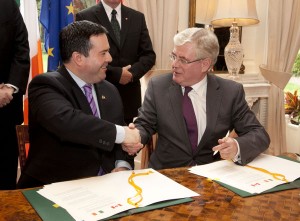
Ireland has had a difficult last six years. The Celtic Tiger Economy refers to the economy of the Republic of Ireland between 1995 and 2000, a period of rapid real economic growth fuelled by foreign direct investment, and a subsequent property price bubble which rendered the real economy uncompetitive. The Irish economy expanded at an average rate of 9.4% between 1995 and 2000 and continued to grow at an average rate of 5.9% during the following decade until 2008, when it fell into recession. Since 2008, many Irish youth have been looking for opportunities abroad.
Irish national youth speak good English, are well educated by world renowned universities, come highly skilled and can easily assimilate into developed economies in countries such as Canada. Traditionally, Irish Nationals have come to Canada via the IEC (International Experience Canada) Program, which has been continuously upping their quota of Irish visas extended every year. The working holiday visa under IEC has worked well in the past. The Program has served as a two year work experience open permit for foreign nationals between the ages of 18 and 30. It is understood that at the end of a working holiday visa, that the foreign national return to their home country, and be in possession of a departure ticket as well as the needed travel funds and medical insurance to ensure their stay is fully covered. A participation fee of CDN$150 is also payable at time of application.
The IEC Program – History and growth
The highly anticipated opening of the IEC Program on March 13, 2014 was capped at its maximum quota (3,850 applicants) within 7 minutes. We anticipate a second round shortly; however, it is proving challenging for applicants to successfully obtain their visa through this program as demand for the program outweighs current resource levels to run the program.
This year’s IEC Program made a further 2,500 work permits available to Irish Nationals who already have a secured job offer in Canada, and an additional 500 work permits were issued to Irish foreign nationals who were willing to do a cooperative educational program as part of their Post-Secondary studies to gain international work experience in their field. And these current quotas of work permits are expected to grow.
Canada needs highly skilled workers and wants to attract them to fill temporary skilled labour shortages specifically in the western provinces. Canada has recently renewed a commitment to Ireland to extend the open permit after several visits to Ireland by Minister of Citizenship & Immigration in 2012 and praised Irish apprenticeship programs for their certification standards. The Calgary Economic Development has just sent a delegation of 6 companies to Dublin’s Working Abroad Expo Recruitment Fair (March 22-March 30, 2014) in order to recruit skilled labour to fill Alberta’s current shortages.
Trade agreement set-up between Canada and the UK and Ireland
Canada wants to do even more to attract skilled labour from Ireland and the United Kingdom. On March 14, 2014, it was announced by CIC that a new international study will be launched, in an effort to help British and Irish tradespeople assess their skills against Canadian trades criteria, fully supported by CIC. In other words, streamlining the foreign credential recognition process for people coming from these countries is a high priority for the Canadian Government. The ACCC (Association of Canadian Community Colleges) and the UK NARIC (United Kingdom National Recognition Information Centre) have signed an agreement to work together for mutual recognition of skills, competencies and certifications. Both organizations will work with employers as part of the CIC-funded Canadian Immigrant Integration Program, which provides settlement and integration services to newcomers in Canada. Specifically, the organizations will be concentrating on the following areas of international competency which are in high demand across Canada:
-
Heavy Duty Equipment Technician
-
Construction Electrician
-
Welder
-
Carpenter
-
Steamfitter/Pipefitter
-
Plumber
-
Machinist
-
Industrial Mechanic (Millwright)
-
Powerline Technician
As well, electronic tools are currently being developed, and UK NARIC expects to have an electronic guide published that will feature all the provincial and territorial apprenticeship authorities, which will be a “textbook” to be used by employers, workers, and trade associations in order to assess credentials quickly and fast-track the process for a foreign national to obtain their trade certification. This program intends to assist the Federal Skilled Trades Program applicants under the Federal Stream, in creating an international partnership and streamlined process of integration into the Canadian economy.
What to do if you want to immigrate to Canada
If you are currently a tradesperson from Ireland or the United Kingdom, you want to ensure that you know which program you wish to apply for to immigrate to Canada. As mentioned before, there is the IEC Program but it quickly reaches its cap, preventing further applicants from applying. If you have a job offer, you can apply for a work permit to come to Canada. If you meet the area of skills needed across Canada in the Trades, then the Federal Skilled Trades Program may be a good fit. There are other Federal Programs and Provincial Programs which also may be considered such as the Canadian Experience Class Program, the Provincial Nominee Programs, as well as special projects (Pilot Projects). Before applying, consider talking to either a trusted advisor or an immigration expert that can advise you on the best program for you. It is vital to do your research into Canadian culture, to look at foreign credential recognition as the first order of business, and to consider the expense of immigrating to a new country as a temporary worker. For skilled workers already in Canada, you will want to ensure that you have started additional applications working towards permanent residency status should you wish to stay in Canada.
Some final considerations
As the Federal Government continues to develop strategies to attract temporary foreign workers and to meet the economic demands of Canadian industry, it is abundantly clear that good sources of workers are coming from Ireland and the UK due to their adaptability and skills. As the IEC Program has reached its quota since launching in March 2014, many Canadian employers may not successfully recruit their temporary workers this year. Demand is high and is only expected to grow. But again, there are other options available to these employers and workers, should they wish to avail of other immigration programs on offer in either of the Federal or Provincial programs. And CICS Immigration can certainly help in assessing your eligibility in looking at other immigration avenues to pursue.









